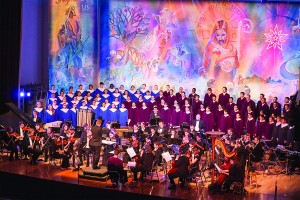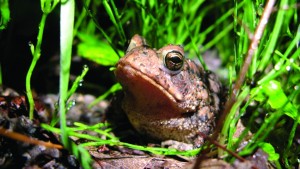The Houghton College website says, “The 2013 Christmas Prism, Savior of the Nations Come!, is an artistic exploration of the joy of Christmas manifest through music, dance, visual art, and poetry.” Although the show itself is a testament to the hard work and dedication of the performers, hundreds of hours of effort go into the production before any performer takes the stage.
 Phyllis Gaerte, Director of Community Relations, opened the conversation by joking that she has had so many interviews with the Star this year that she should be well prepared for any questions. As a part of the Department of Community Relations, which organizes all the public and signature events for the college, being a target for interviews is quite understandable.
Phyllis Gaerte, Director of Community Relations, opened the conversation by joking that she has had so many interviews with the Star this year that she should be well prepared for any questions. As a part of the Department of Community Relations, which organizes all the public and signature events for the college, being a target for interviews is quite understandable.
Although not a part of the onstage performances, Gaerte plays an integral part. She said, “For Prism, this means giving a birds-eye view of the whole Prism event…Outside of the performance itself and what the music department needs to do to make sure that is the quality is what it should be, community relations is responsible for all the other aspects of Prism.”
The Community Relations Department works closely with the Marketing Department on promotion, handling box office issues, providing ushers at events, organizing the upscale dinner for over 200 people–including finding decor and planning a menu in conjunction with Sodexo–that precedes the performance, and developing the budget alongside other administrative offices.
John Buteyn also gives much of his time to making Prism the astounding display it is. He is both the designer and engineer of the lighting at the performances not just in Houghton, but also in Rochester and Buffalo. Additionally, Buteyn will be assisting with the live sound and recording for each performance, and in order to organize everything, he begins his work months in advance.
This year, Buteyn said that the budget was used to purchase lighting gear, instead of merely renting it. Although this is believed to be a better use of the budget, there is now much less lighting gear available than in the past. To create a visual experience on par with previous years will be quite a challenge. Buteyn joked, “I think I’m up for it.”
Buteyn describes other challenges such as older venues in Rochester and Buffalo that sometimes aren’t equipped to handle Prism’s power demand, where he “can’t tell you how many breakers I’ve tripped…Last year, I even stationed a student worker at the breaker box for the entire performance just in case.” Challenges allow an opportunity to improve though. Such as switching to LED lighting to reduce the power required. He said, “There is always something to learn, each year, at each performance, at each venue… I better understand the layout, architecture, and natural beauty of the venues to highlight with the lighting design.”
It is not without a humorous side though. “Let’s just say, when all the techs are working on very little sleep and very few calories, laughter keeps us going. Well, laughter and caffeine,” Buteyn joked.
Gaerte sums up Prism by telling a story from Houghton’s first year in Buffalo. This young woman came out to the ticket table with both her mother and grandmother: three generations of people familiar with the church. “Her words to me were: ‘This church seems to be dying, but it came to life tonight.'”


